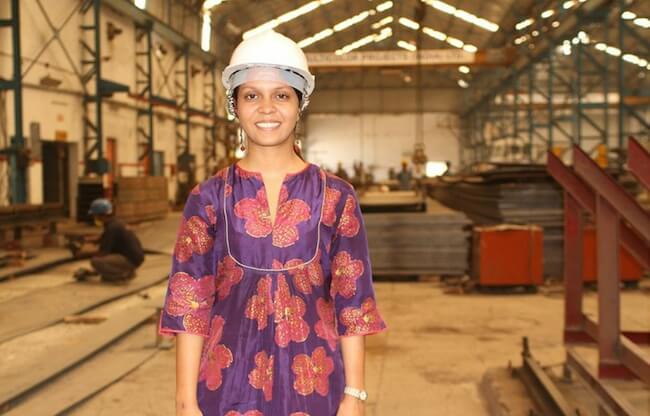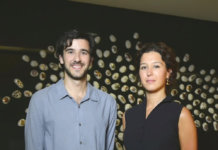Interview with Priyanka Gupta, Executive Director, MPIL, India
Indian steel contractor Ashwani Gupta founder always wanted his children to join him in his business. But whether he knew what exponential growth the business would know once his daughter came on board in 2008 is unknown: Priyanka Gupta joined her father’s business and first and foremost started a steel manufacturing plant. Probably one of the first women in India to venture into this specific industry, Gupta’s energy contributed to growing the family business manifold over the past few years. Today, MPIL Steel Structures limited is a steel-manufacturing house for heavy steel infrastructure, producing the large steel sections for airports, power plants, bridges, high ways, high-rise buildings, and industrial factories.
Does Priyanka’s drive make her a typical member of Generation Y and what other factors were at play when she joined the business? These and other questions Priyanka Gupta sat down with Tharawat magazine to answer.
[ms-protect-content id=”4069, 4129″]
The family business springboard to entrepreneurship
Priyanka Gupta is by all standards a very accomplished young woman. Holding an undergraduate degree international relations and gender studies as well as a Masters degree in international public finance, she found her way home to India from her studies in the United States in 2008. “I wanted to do something in the real economy and not just crunch numbers. I wanted to create. There was no future in manufacturing in the US and it became clear that going back to India made sense. My father was not in manufacturing then but had enough resources to start operations,” In fact Priyanka’s father could not have been happier when hearing that his daughter would join the business, having put considerable effort in making the prospect of the family firm sound good to his children. “When I told my father that I wanted us to go into steel manufacturing he agreed right away. I realised soon enough that a small family business like mine is a great springboard for entrepreneurship. I could have used the same exact setup to go into any kind of production or business. It’s the mindset that allows it.” In fact Priyanka is currently writing a book about this very phenomenon and explores semi-academically the dynamics of small business families. “I feel that if you have the ambition and the drive to create social value and innovation then the potential of the family business platform is tremendous. Instead of starting from scratch and spending five or six years building everything you already have these resources that you can count on. Many of them are intellectual and emotional.” Priyanka’s view and attitude goes contrary to what the common belief is in India. “They think that family businesses are unprofessional. But there is so much to learn from them. Through the Western lens it might look like chaos but you can learn a lot from all the grey areas and the intellectual capital. When you assimilate but a little of that there is so much acceleration in doing business as a consequence,” she explains eagerly.
Priyanka did take advantage of the springboard and sprang higher than even she expected in spite of a rocky start. “When we started the manufacturing of large steel constructs in 2008 the steel industry crumbled around the world because of the crisis. For the first two years it was an uphill struggle and not exactly fun. My father cut back on expenses but refused to fire anyone. This attitude was shared by many family businesses in India throughout the crisis and it led to everyone starting to appreciate them more for being frugal and traditional because it paid off in the crisis.” Gupta started becoming interested in the family business topic especially in succession and started teaching at business schools around the country. “I tell my father that even when we have a bad days it makes for good material for my book and my teaching,” she laughs. Her work centers around real life examples of small sized family businesses and the challenges they face.
The Guptas went from a one-man operation to employing several hundred employees in the span of only a few years. Priyanka tells us how: “My father was a steel contractor before we started our manufacturing company when my brother and I joined in 2008. My brother is a human rights lawyer. All three of us have completely complementary skills. We are a great team. Today we have two factories active and one factory in the set up stage.”
From Child to Adult
“As kids instead of going to fun parks we went to the factory! We saw car manufacturing facilities, steel plants and rolling mills. My father has tremendous curiosity for all things new. We understood hydraulic pumps and systems and my father would keep us interested and encourage us to ask questions,” she remembers. Gupta’s father was a self-starter and always discussed the business at home. “We always knew about every single problem of the business.
Everything that he did translated into such huge opportunities for us and that’s why we respected the business a lot. We respected the way he ran it and built it against all odds.” Priyanka Gupta confesses that to her and her brother, their father is still larger than life and that he had never made a secret of wanting his children to join the family business. “From my father’s perspective you build this business for your kids. We know that people meet me or my brother purely because of my father’s reputation. He is so brave to open up to us and let us have full access. He is not a micro manager. Our relationship is unique. It is so easy to run with his passion. When ideas backfired he takes care of it or he tweaks it. I think a lot of the success of entering the family business depends on how crazy your parents can be!”
Within the family business
“I knew what to expect because we were so involved in the business from an early age. It was not news to me,” states Priyanka when we ask her whether her expectations were met after joining. “I knew there was a lot of work to be done but I was usually met with tremendous support. I think we had limited resources and when you are a private business and try to make profit and money but also at the same time transform the nature of the business it’s a huge challenge.”
Priyanka’s first task was to automate billing for the whole company, which took her the better part of 18 months. “It really taught me so much about the business. I became aware of every single operation in great detail. My grandfather who produced plastic caps used to say that if you know everything about the billing cycle you will know everything about the business. And my father clearly agrees with him,” she smiles.
The Guptas took small steps towards fulfilling all their goals. One of which was particularly close to Priyanka’s heart: “We made sure that there was at least one woman per department. Now we have several women per department and it is working really well. It is easier to implement such things in the family business. We had a lot of discussions about how we recruit and retain people. You know, succession does not only concern the family but also the employees,” states Priyanka sagely.
“We created the MPIL circle of trust a program dedicated to team building in the company. We did that because there were so many people who had worked with my father for decades and we wanted to make them comfortable and for them not to see my brother and me as a threat. The program really developed and it’s for people who have been with us for three years or longer. The MPIL family is dependent on the family of the staff. You can do lots of small things that have a great impact immediately.”
Innovation on a budget
Priyanka’s drive to make things happen is apparent from everything she says and does but circumstances were not always in favour of change when she first started working in the family business: “I realised that we had no budget to introduce innovation. When I started working on the automated billing solution, there were paper trails and that’s all. Even if I had wanted to buy expensive software we just didn’t have the funds for it. I could chose between raising the funds to buy the software that I wanted or just design a solution myself. That’s why it took us so long,” reflects Priyanka. “However, even if we had had the best software it would have been of no use because one department didn’t know how to communicate with another department. I had to get my team together and I did that by doing everything manually first. Everything was stamped and labeled by hand and so we gradually found out where the information was missing and where the processes failed.” Priyanka reflects with satisfaction on the lack of resources that indirectly were the key innovation in the way the family business was run. “In our family we always discussed spending. We discussed what made sense what we wanted to spend it on. We even now discuss any capital and expansion because we just don’t take anything for granted. And now we are four people with four different backgrounds four different educations debating this in the family. We really come up with a solution, which works best.”
But technological innovation faces a further obstacle due to the context explains Priyanka: “There is a huge disconnect between what you perceive as being the necessary speed of innovation and what is actually possbile. We are used to our devices and computers and use them most days for several hours. However, many of the people working at our plants and our offices do not have this access to technology at home and their only point of reference is the office. So implementing changes in the way the business is operated has to be realistic with respect to the capacity of your people. It is not good or bad it is just the reality.”
The Gupta siblings
Priyanka’s brother Alok is only a few years older but joined the family business after his sister. “It took us a long time to find a way to convince my brother to join the business,” she smiles. “He had to find his own way to us. He is a human rights lawyer and cares about different things. But when we got a project from a client to create the steel structures for a sola installation, Alok’s attention was immediately arrested and we knew we had found the hook!” Priyanka laughs heartily when she remembers how they courted her brother to join the team. “We offered him to start a renewable energy division in the business. It really fit with his personality. Also it was great because he was able to build something of his own and did not have to join exactly what I am doing so each one of us got to carve his own space. And so he started the MPIL solar division.” The Gupta siblings are delighted to be working together. “I told my parents that they should have had more kids,” she smiles.

A new kind of independence
“We come back and we live with our family and that is the norm,” answers Priyanka when we ask her what it was like to give up her independent life in New York to come back to India. “It is not up for negotiation. A lot of things had to be formulated. I chose the battles I could win.” Priyanka here goes on to emphasise how important it is for young generation members to have hobbies. “In a family business there is such a great support network for that. There is no excuse not to follow your passions. My family is greatly in favour of me pursuing other interests. If you don’t have hobbies you are really not doing everything that you can to improve your business,” states Gupta. “So many solutions you need for your business lie outside your work day. I feel as a leader you have an obligation to have a life outside the office.”
Generation Y in the family business
“Being part of our generation can be frustrating because we know what happened in the past and we have ambitious visions of the future but we don’t know how to make the two realities connect. The frustration stems from knowing how fast things could go as opposed to how they are actually going. We want the future to be here now,” Priyanka Gupta explains that the greatest challenge is to communicate the vision for the future to the older generation and also the staff. “How fast do you bring your entire team on board? How can you tweak your vision based on the resources you have? Are you the kind of person who can do that? It is all about realistically articulating what is the present and what is the vision for the future based on that present.” It is an interesting hypothesis that comes forth from what Priyanka says, one that stipulates that the perceived drive of Generation Y members stems from the frustration of perfect knowledge of what could be while struggling with the status quo.
Priyanka’s advice to family businesses interested in retaining their Gen Y members is simple: “If it really matters to you to have your children join, you have to be willing to a certain extent to let go of what you want the succession or the vision to be like. Sometimes the next generation will take the brand into totally different directions. As a business owner you might get kids who want to keep it the way it is but even then they are going to change things. And that is really important.” Priyanka thinks that it comes down to how much effort families make in involving the young generation in the past. “Have you asked their feedback at different stages. Have you asked them to help you trouble shoot? Don’t forget that if you make someone feel valuable then they will be interested in contributing positively to what is already there. I think the family business is a great career prospect for Gen Y members: Let’s face it, there will be politics in any organisation you join so you might as well go for the family business where you already know what is expecting you.”
Tharawat Magazine, Issue 23, 2014
[/ms-protect-content]














